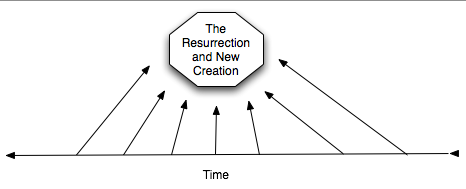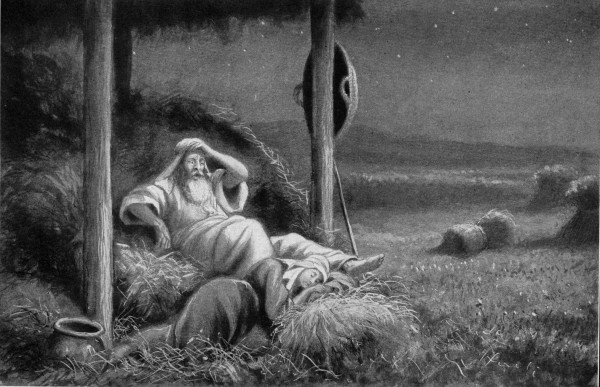 Well, I don’t want to be quite so strident, but some have no such qualms. This past week I came across, via Facebook, this post “Are Christians Wrong About Heaven?” which was in turn inspired by this old interview of NT Wright in Time magazine. So in the more recent blog post the author, Matthew Ryan Hauge, Ph.D. 1Mine is a “DPhil” in case anyone is interested. That’s just how Oxford rolls. says that yes, most Christians are very wrong about heaven.
Well, I don’t want to be quite so strident, but some have no such qualms. This past week I came across, via Facebook, this post “Are Christians Wrong About Heaven?” which was in turn inspired by this old interview of NT Wright in Time magazine. So in the more recent blog post the author, Matthew Ryan Hauge, Ph.D. 1Mine is a “DPhil” in case anyone is interested. That’s just how Oxford rolls. says that yes, most Christians are very wrong about heaven.
For example, according to Christian folklore, when Christians die they go to heaven.
If some Christians choose to believe that when they die they go to heaven that is entirely up to them… As long as these same Christians understand that this belief is not present in the Bible.
He goes on to cite 1 Thess 4:13-17 and seems to focus upon the fact that Paul did not want them to be “uniformed.” He surmises that their misinformation was regarding the Greek conception of Hades.
Hades was neutral. Good, bad, rich, poor, young, old – everyone who died descended into Hades to live out a meaningless and gloomy existence. This is the source of the hopelessness of our church in Thessalonica. Loved ones have died, descended into Hades, and are now lost forever. This is the misinformation that Paul is addressing in this passage.
He goes on to state that the dead in Christ are not lost, “on the contrary, they are awaiting the return of their Lord.” So without being explicit in his reasoning, Hauge seems to be arguing that when Christians die they go into a state of suspended animation, often referred to as “soul sleep.” Again, he does not state that this is his understanding, but he does say that it is not a biblical teaching that “when Christians die they go to heaven” and that instead they are “waiting for the return of their Lord.” I will also make an assumption that in referring to 1 Thess 4, he is also focusing upon verses 16-7, with the emphasis as indicated:
16 For the Lord himself, with a cry of command, with the archangel’s call and with the sound of God’s trumpet, will descend from heaven, and the dead in Christ will rise first. 17 Then we who are alive, who are left, will be caught up in the clouds together with them to meet the Lord in the air; and so we will be with the Lord forever.
Confession: I have not read Wright’s book(s) on this subject. I know he has written on it extensively, but in the article cited, he does have a few relevant bits to say that seem to both contradict and confirm Hauge’s position. I want to encourage my readers who do know Wright well, and you are legion, to feel free to correct or add to my knowledge. But from that article we have these two quotes:
We know that we will be with God and with Christ, resting and being refreshed. Paul writes that it will be conscious, but compared with being bodily alive, it will be like being asleep.
There is Luke 23, where Jesus says to the good thief on the cross, “Today you will be with me in Paradise.” But in Luke, we know first of all that Christ himself will not be resurrected for three days, so “paradise” cannot be a resurrection. It has to be an intermediate state. And chapters 4 and 5 of Revelation, where there is a vision of worship in heaven that people imagine describes our worship at the end of time. In fact it’s describing the worship that’s going on right now. If you read the book through, you see that at the end we don’t have a description of heaven, but, as I said, of the new heavens and the new earth joined together.
So it seems that Wright is making a clear and concise distinction between the state of the soul and the bodily resurrection. 1 Thess 4 refers to the bodily resurrection, the rejoining of our spirit with our body. But he also seems to be acknowledging that we are “with Christ” in that intervening period. I am not sure how he reconciles Paul saying that it will be “conscious but…like being asleep.” I would not consider being asleep as being conscious, would you? I also think Paul is clearly using a metaphor, trying to explain how it can be that the body is inert yet we still live he compares it with sleep. We do not necessarily have to take the next step to extend that to our souls being asleep.
 I have already suggested a rather unorthodox suggestion of what might happen when we die, but I am not dogmatic about these matters. Why? Because the Bible is not explicit about the matter. Passages like 1 Thess 4 and all of Revelation are of necessity full of symbolic language, attempting to convey fundamental and complex truths in understandable imagery. Those truths are that we will be raised with Christ, we are granted eternal life, God will restore his order and kingdom, and he will be just. But the details are significantly lacking. I do not mind one contemplating and suggesting what the details and the mechanics of it all might be, again, I have offered my own musings as a possibility, but when we begin to be dogmatic about it, deciding who is (W)right and wrong about the matter, about the mechanics of the matter then I back away from the discussion. No good will come of that because it is a conversation had in ignorance.
I have already suggested a rather unorthodox suggestion of what might happen when we die, but I am not dogmatic about these matters. Why? Because the Bible is not explicit about the matter. Passages like 1 Thess 4 and all of Revelation are of necessity full of symbolic language, attempting to convey fundamental and complex truths in understandable imagery. Those truths are that we will be raised with Christ, we are granted eternal life, God will restore his order and kingdom, and he will be just. But the details are significantly lacking. I do not mind one contemplating and suggesting what the details and the mechanics of it all might be, again, I have offered my own musings as a possibility, but when we begin to be dogmatic about it, deciding who is (W)right and wrong about the matter, about the mechanics of the matter then I back away from the discussion. No good will come of that because it is a conversation had in ignorance.
One of my favorite suggestions is that we contemplate spiritual matters in the ration in which they are presented in the Bible. Concern about demons and hell? Yes, it is present in the Bible, principalities and powers, the judgement of the righteous and the wicked, are all addressed in the Bible and specifically in the Gospels. But how much of Jesus’ time was spent on them? Far less than on conveying the message that Jesus is the Son of God sent to bring forgiveness of sins to the world, than he spent on teaching us to love even those we do not like very much. The same is true for the discussion of what happens when we die. As Wright points out,
Our culture is very interested in life after death, but the New Testament is much more interested in what I’ve called the life after life after death — in the ultimate resurrection into the new heavens and the new Earth.
Ultimately I think we do have to remember why it was that Paul was touching on the topic at all. It wasn’t so much to correct a doctrinal error, but to encourage them that those who had died in Christ were not lost forever. (Hauge is quite right about that.) We will be raised with Christ, we will inherit the Kingdom of Heaven, and we will be reunited. Let us focus upon those truths, shall we? And we can leave the rest for discussion with a bit of port, so long as you are willing to concede that while I may not be right, I may also not be wrong.
- 1Mine is a “DPhil” in case anyone is interested. That’s just how Oxford rolls.






10 thoughts on “Another Christian wrong about heaven.”
Hi Christian,
It appears you disagree with my reading of the text, but I am not exactly sure how you disagree. Can you clarify so I can more accurately respond?
By the way, I really enjoyed meeting you and your family this past fall in Baltimore.
Regards,
Matt Hauge
Thanks Matt! It is good to hear from you. As I said in my post, I do think I disagree with your reading of the text, but your exegesis is not clear to me either. I have reposted the relevant bit below, but in short, you seem to be saying that when we die we go into some sort of sleep or suspended state rather than immediately present with the Lord. I do not think that such a reading (necessarily) follows from 1 Thess 4. I wrote:
Did I piece together your reading correctly? That because 1 Thess 4 speaks about “the dead in Christ will rise first” you take that to mean that the souls of Christians (and presumably everyone) upon death go into some sort of stasis? I admit, I was a bit confused by your reference to Hades because you seem to be rejecting (or saying that Paul is correcting) the Hades/Sheol idea that upon death everyone goes there to await the Day of Judgment. But then you go on to say that Christians are “awaiting a time when our Lord will return.”
I am suggesting that 1 Thess 4 speaks to our physical resurrection. That does not, however, preclude our being present with the Lord even upon death. Wright himself points this out with reference to Rev. 4-5.
Now how he squares that with also believing when we die “enter an intermediate state” I am not sure. (Remember, I have not read much of his stuff in the last 8 years.) It may be that he views it as I (may) do, that we are already in the presence of Christ (as in Rev. 4-5) while there is still “work to be done” on earth. It seems that is his argument. In contrast, you seem to be saying that there is essentially nothing for us until trumpet sounds.
My primary point in all of this is that the Bible, OT and NT, Gospels and Epistles and Revelation, give us very little information (next to none) on what happens when we die and only a relatively small amount of non-metaphorical language about what happens when Christ will come again. We are given assurances and promises, but the details are left out. It is ironic, of course, that I am spending so much time lately writing about the fact that I think we can, if we are not careful, find ourselves spending too much time arguing about these matters.
But that is the nub of it: I read you as believing in a kind of “soul sleep” or suspended animation state of our souls until the bodily resurrection. Is my reading of your reading correct?
Thanks Chris – your response was really helpful.
No, I am not espousing “soul sleep.” In fact, this concept was only brought to my attention after I posted this article. The Bible, and many ancient writers, use “sleep” as a metaphor for death, but it is only a metaphor.
In Thessalonians, Paul wisely refrains from saying to much about what it ultimately unknown. That is, Paul
Sorry about that. I accidentally hit reply.
That is, Paul rejects the ancient notion that the dead are definitively lost, but that is all he really says on the matter.
In fact, Paul prefers only to speak about the ultimate fate of the righteous dead, which has led some to conclude that he is an annihilationist when it comes to the wicked dead.
And I absolutely agree with you that Bible rarely speaks of postmortem fate, a theme I plan to address in an ongoing basis in this series. In contrast to popular Christian culture, the Bible prefers that we concern ourselves with the manner in which we live during this life.
In fact, the vast majority of postmortem traditions in antiquity were utilitarian. In other words, the purpose of telling these stories was not to describe life after death, but to inform life before death. On that note, I would love to hear your thoughts on my recent post in this series:
http://www.biblestudyandthechristianlife.com/do-christians-belong-in-hades/
The question of an intermediate state is a tricky one largely because the Bible is unclear on the matter. The early church mothers and fathers wrestled with this issue, a subject I pan to treat in the future.
In short, I read Paul as giving us hope that in some way Thanatos has been defeated. Death is no longer the mortal enemy of humanity because of the cross. Yes, we all will die, but death is not the final plot in our story.
Does this make sense?
Your comments make sense within themselves, but I don’t understand then why you are saying when we die “we don’t go to heaven.” What point are you trying to make?
As an aside, I find those like Wright who argue that having too strong a belief in immediate heaven/resurrection is detrimental to the lives of contemporary Christians curious. I hear this argument frequently (and refer to it in my recent blog post Are eschatology and apocalypticism “healthy”?) yet I do not find it often in practice. Now, if we wanted to consider some from the ancient and medieval traditions like ascetics and hermits I would find that a more compelling argument. They should have been working hard “in this world” rather than removed and simply waiting for the next. In my experience, however, I find it very rare in actual practice.
Back to the point at hand, so if we don’t go to heaven when we die and you don’t believe in soul sleep, what is your opinion of what does happen “in between”? I look forward to your future posts on the matter.
“Heaven” is a physical domain of the gods in antiquity – that is my point. This underlies the significance of the ascension of Christ in the Lukan corpus – an issue I plan to treat in a future post. When we as mortal claim divine space this blurs the boundary between us and God and the Bible wisely recognizes that this is a problem systemic problem of the human condition. That is to say, we want to be gods, but we are not. When we attempt to be like gods this is unhealthy for us.
Per your comment about eschatology, I have not read much Wright – only Simply Christian and The Meaning of Jesus. I assume if he is hesitant about the popular use of eschatology it is because it is (oftentimes) used as a posture of escapism from the Bible’s explicit invitation for us to live differently and participate in the kingdom of God now. However, if properly understood, eschatology can serve as a beautiful vision of the world as it ought to be and inspire us to re-imagine how we do world.
Per our fate immediately after death, I have no idea. The Bible is silent and I think it would be wise for us to follow its lead.
Matt, again I apologize because I think I am not following your argument. You seem to be saying (as I read it) that heaven is for gods and not a place for us. “When we attempt to be like gods this is unhealthy for us.” Yet aren’t passages like our other discussion on John 14. Isn’t verse 3 saying that while it is not healthy for us to strive to get to heaven on our own through Jesus we do enter. “3 And if I go and prepare a place for you, I will come again and will take you to myself, so that where I am, there you may be also.”
In short, your first paragraph reads as if you are saying heaven is not a place for us, that we will not go to heaven. I assume I am misreading you, so what are you saying?
“Heaven” is a concept John uses infrequently. It occurs 153 times in the Gospels, but only 16 times in the Fourth Gospel. Furthermore, nine of those occurrences appear in 6:22-59 (i.e., “I am the bread of life”). In other words, I think that John maintains the strict separation of mortals from immortals. This underscores the significance of Jesus’ occupation of the “above” and his descent below to bring light to a dark place.
I do agree that John claims that we will be in the presence of God eschatologically in a kind of divinely constructed monastery (per John 14), but there simply is no evidence (to my knowledge) that we will dwell in the presence of God in “heaven” postmortem prior to the eschaton.
This is why divine mediation (via the incarnated Logos) was necessary. We cannot access the Father because the Father dwells in a domain that is not our own.
OK. Leaving aside for a moment whatever is “in between” (postmortem, pre-eschaton) it sounds like you are not suggesting that humans will not enter heaven. It is just that you are again trying to make the distinction between what happens after we die (you don’t know what happens, you just know we are not with Christ in heaven [seems Wright suggests that such is happening in Rev. 4]) and once Jesus comes again, Day of Judgment, etc. But once that happens, we are in…what? the new heaven and new earth complex?